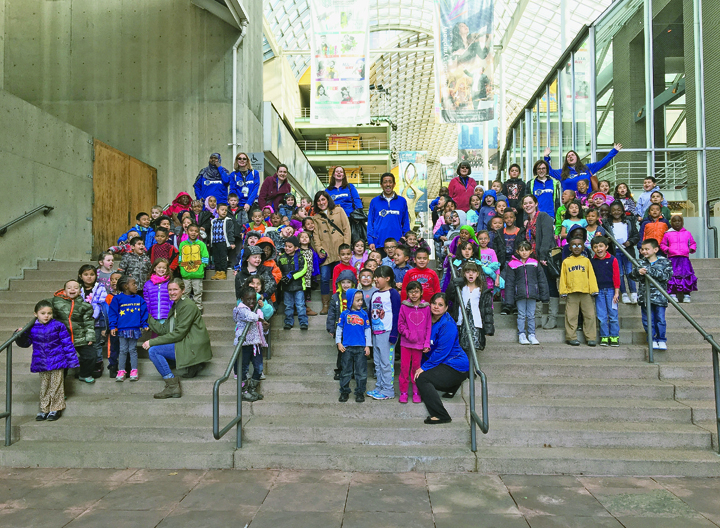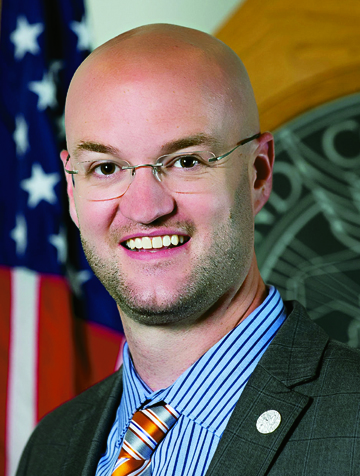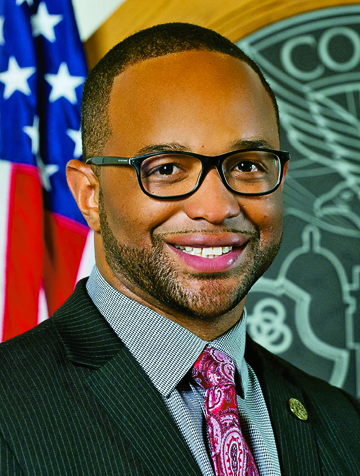
by Mark Smiley | Mar 1, 2017 | Main Articles
Reform Or Wasted Opportunity?
by Ruthy Wexler
 On December 15 the Denver Public Schools (DPS) announced that it would close/restart three public elementary schools — Greenlee, John Amesse and Gilpin Montessori — pursuant to its new non-subjective School Performance Compact. The outcry was enormous with parents and teachers protesting vociferously. The dispute hit the news media with the local television stations and The Denver Post doing overview stories on the subject. One Denver School Board member called the decision “gut wrenching.”
On December 15 the Denver Public Schools (DPS) announced that it would close/restart three public elementary schools — Greenlee, John Amesse and Gilpin Montessori — pursuant to its new non-subjective School Performance Compact. The outcry was enormous with parents and teachers protesting vociferously. The dispute hit the news media with the local television stations and The Denver Post doing overview stories on the subject. One Denver School Board member called the decision “gut wrenching.”
As one of the targeted schools, Greenlee Elementary, is located in the Cherry Creek Valley, the Chronicle decided to drill down and find out exactly why DPS might be closing a school against the apparent, adamant opposition of a majority of its parents — and whether such a decision, in fact, made any sense.
A (Measured) Work In Progress
On a sunny day in late January, Sheldon Reynolds, current principal of Greenlee, discussed his school with a visitor. A former teacher herself, the visitor kept expecting knocks on the door, announcing various crises. But the school hummed quietly around them as the affa ble educator described practices he and his team had put in place in order to grow a “new culture” at Greenlee.
ble educator described practices he and his team had put in place in order to grow a “new culture” at Greenlee.
Sheldon — as he’s known in the community — has been principal for just a year and a half.
Occasionally, he allowed glimmers of pride to spark his eyes, telling of students who now believe they can succeed. At no time did he denounce standardized tests, the results of which have put his position in jeopardy.
Colorado students all take the CMAS PARCC state assessments every Ap ril. These tests provide Median Growth Percentiles, a measure of how much a child has learned in a year. Results are combined into one “academic growth” score for the school.
ril. These tests provide Median Growth Percentiles, a measure of how much a child has learned in a year. Results are combined into one “academic growth” score for the school.
Before Reynolds came, Greenlee’s academic growth was measured at 27 percent. He’d been there only seven months when students took those tests again in April 2016; results had bloomed to 48.8 percent.
“I’m not opposed to standards, not at all,” said Reynolds, whose youthful looks belie years of experience. “What I take issue with is the pass or fail, all or nothing decision. DPS’s benchmark is 50 percent. We were essentially only one point away in academic growth, the indicator DPS values most!”
Making Connections
Academic growth is indeed what DPS cares about most. “We don’t judge where a student starts,” Tom Boasberg emphasized. “We care how much they improve in a certain time period. This philosophy is especially important in low income neighborhoods.”
Greenlee definitely falls into the category of low income neighborhood. Almost 95 percent of its students qualify for free or reduced lunch. Many live in public housing. Seventy percent are “direct certified”; i.e., students experiencing homelessness or foster care. Located at 1150 Lipan Street, Greenlee is a stone’s throw from the colorful Santa Fe Arts District. Isolated by poverty, residents may as well live on the other side of a wall.
“We want to remove those invisible barriers,” Reynolds said. “So we’ve made many community connections … the La Alma-Linc oln Park Neighbors Association, the Art District, a local veterinarian, an architect … We have a Running Club now, led by a local businessman. Black and brown kids see black and brown males in leadership positions; that breaks down barriers, too.
oln Park Neighbors Association, the Art District, a local veterinarian, an architect … We have a Running Club now, led by a local businessman. Black and brown kids see black and brown males in leadership positions; that breaks down barriers, too.
“And we’re not afraid to try something new! The community helped us go see The Nutcracker. Yup, all 300 of us!”
Three hundred students at the Denver Performing Arts Center? Weren’t there, um, discipline problems?
Reynolds tried to make the visitor understand. “We don’t concentrate on what our kids do wrong. If they make a mistake … we remind them of our school standards, our culture. They get a chance to correct that mistake.”
He grins. “We had a great time at The Nutcracker.”
Change
Reynolds never intended to go into education. “My dad was a  principal; I was going to do something else entirely.” Graduating from George Washington High, he chose a college in Las Vegas. But working one summer at his father’s school, Reynolds realized, “I want to work with kids.” He taught in Denver for a number of years, then took a job in North Carolina as assistant principal. After that, as principal, he built Lakewood Montessori into a high-performing, award-winning NC public school.
principal; I was going to do something else entirely.” Graduating from George Washington High, he chose a college in Las Vegas. But working one summer at his father’s school, Reynolds realized, “I want to work with kids.” He taught in Denver for a number of years, then took a job in North Carolina as assistant principal. After that, as principal, he built Lakewood Montessori into a high-performing, award-winning NC public school.
In August 2015, Reynolds came home to Denver: he’d been asked to take over Greenlee Elementary, a struggling school DPS had singled out for help back in 2010. Because he’d started Lakewood “from the ground up,” Reynolds felt he could do the same here.
“But you don’t just come in and start making changes,” he says. “You listen. You look around.
“What did I see? That the perception of the school wasn’t great. Things weren’t working. But I found some really strong pieces. The staff for one.”
Reynolds and his teachers created a five-year roadmap, a “Possibility Plan.” They adopted “HOME OF THE STARS, HEART OF THE CITY” as their slogan — and believed it. “We started building our culture through a talent dev elopment model,” Reynolds explained. “If we see students as talented and gifted, they see themselves like that. We found talents — not just academic, but artistic, athletic, leadership — and built on them.
elopment model,” Reynolds explained. “If we see students as talented and gifted, they see themselves like that. We found talents — not just academic, but artistic, athletic, leadership — and built on them.
“We did it with teachers, too. I identified the most qualified teachers, they became leaders, coaching the others. That leads to mutual respect and better teaching all around.”
“He’s given teachers the opportunity to take on leadership and it makes us more dedicated, in our classrooms and to each other,” says art teacher Jessica Plate. “I’m part of the Cultural Leadership Team. We want our students to be expressive, healthy and enlightened.”
Before, bad behavior stood out. Now, teachers rewarded good behavior with extra recess and awards. Academics took on a joyous note: students who met reading goals got to spray their principal with silly string. A blown up photo of that giggly event hangs in a hall, alongside images of Greenlee students laughing, hugging, quietly thinking.
“All that love and respect you feel?” said a teacher. “That’s Sheldon.”
Karen Dunn, Head Start teacher for 17 years, says that Reynolds is the best thing that’s ever happened to Greenlee. “His idea, that we teach to the gifted students and have faith our other students will rise to that level? It works!”
“Yes, things have improved,” Reynolds allowed. “But it takes time — years, really — to build and sustain a quality neighborhood school.”
Denver Plan 2020
The leadership of DPS also formed a plan in 2015 with a five-year goal. The Denver Plan 2020 aims to have “at least 80 percent of district students attending a high-performing school by 2020.” Since approximately half that number are still in schools DPS considers lower-performing, Boasberg feels an urgency to “increase the quality of schools.”
Denver schools are assigned a numerical rating based on test scores and other factors, within DPS’s School Performance Framework. “If a school’s SPF rating remains low for multiple years, and if academic growth is poor in the most recent year, then we mark a school — and we hope never to do this — as designated,” said Boasberg. “That’s when we put the last piece in place, a School Quality Review (SQR).”
This review is done by an independent third party.
If a school doesn’t do well on the review (SQR), it’s in danger of being closed or restarted. (“Restart” means that DPS closes the school and reopens it with a different program, chosen from submitted applications. The winning plan usually changes staff. It always — unless the current principal’s plan is chosen — replaces the principal.)
To make the process of closing/restarting schools more “consistent and transparent,” this past fall DPS put in place a new policy, the School Performance Compact (SPC), with strict cutoffs; e.g., if a school received a “1” in any SQR category, that would be a trigger for closure.
Reynolds had been at Greenlee for three months when they had their first SQR.
He’d been there just seven months when testing occurred. The almost-doubled results fell just short of DPS’s decreed mark.
“If a school has less than 50.5 percent of the growth points, they continue on to the next step of the SPC process,” Boasberg said. “Greenlee was below that mark …” Thus, another review (SQR).
How Children Learn
School Quality Reviews in Denver are conducted by a Massachusetts-based consulting firm called SchoolWorks. On November 2 and 3, 2016, their three-person team, plus two DPS staff trained by SchoolWorks, came to Greenlee.
“What we do,” says Kim Wechtenhiser, who was an advocate for charter schools before she became president of SchoolWorks, “is collect evidence in relation to the protocol’s pre-identified indicators.”
In other words, they observe how student s learn. But they look through a narrow lens. Greenlee’s excellent Spanish class or its third grade teacher who instills a love of books in his students were not mentioned in the report, which reads like a business quarterly review. To wit: “The partially effective promotion of cognitive engagement was evident in 80 percent of classrooms visited.” “The development of higher-order thinking skills was ineffective in 50 percent of classrooms visited.” “Site visit team members noted that some, but not all, students were seen answering and asking questions … however, many were observed … staring off into space …”
s learn. But they look through a narrow lens. Greenlee’s excellent Spanish class or its third grade teacher who instills a love of books in his students were not mentioned in the report, which reads like a business quarterly review. To wit: “The partially effective promotion of cognitive engagement was evident in 80 percent of classrooms visited.” “The development of higher-order thinking skills was ineffective in 50 percent of classrooms visited.” “Site visit team members noted that some, but not all, students were seen answering and asking questions … however, many were observed … staring off into space …”
Asked about SchoolWorks’ report, Reynolds said equably, “Well, it’s a snapshot. Of that classroom, that day. For example, higher order thinking is very important. But you can’t just skip to it. The teacher might have just introduced the concept. [The report] did show things we want to work on. But SchoolWorks uses that snapshot as a diagnostic evaluation …”
Onwards And Upwards
By early December, the SchoolWorks reports were in. Greenlee received “1’s” in two categories.
“We received “1’s” on the exact same questions we received “2’s on the year before,” Reynolds commented wryly. “Our classroom ratings show improvement from 2015 to 2016 but our overall score was lower. We were told that SchoolWorks essentially re-normed or raised the expectations without informing anyone.”
In mid-December, Boasberg made his recommendation: Gilpin should be closed and Amesse and Greenlee should be restarted.
On December 15, crowds of parents and teachers pleaded with the Denver School Board to keep their schools open. Greenlee supporters, citing the Possibility Plan, said they’d begun their own restart. They begged the board to put the restart in Reynolds’s hands rather than someone with no knowledge of the neighborhood.
The Board refused all requests. They felt a responsibility, they said, to abide by their new policy.
On February 2, 2017, Tom Boasberg put out the call for applications to restart Amesse and Greenlee.
Reynolds was encouraged to submit an application.
Asked if he were angry, Reynolds paused. “We had reactions. But we move forward. I’m considering this an opportunity to make the school better than ever.”
Teachers and parents were not so sanguine.
“My child isn’t learning?” expostulated Gina Jones. “That’s B.S. My daughter hated math. Now she explains the concepts to me.”
“I’m very angry,” said parent Angie Huhman. “I love the vision Mr. Reynolds created for us.”
“People will feel betrayed if you get rid of this principal,” said Amanda Johns, with three children at Greenlee. “He turned the school around.”
“What are the kids supposed to think?” said another parent. “They see their teachers working so hard, their principal devoted to them, and then some strangers come in …”
If a new program is chosen, it would not begin until September 2018. “Imagine the tension of a year knowing you’re on the chopping block,” said Jessica Plate. “Already, fifth graders are stressed, they talk about it. This school will go down, not up, if Sheldon’s not part of the restart.”
There’s a large body of research about the harm done to low income communities when schools are closed. Space permits only one quote, the mildest. “Shutting down a school is hugely disruptive,” writes scholar Vontrose Deeds of Northwestern University. “It tears apart social ties … [often] undermining the very student outcomes policymakers are trying to improve.”
“If they change this school around now,” said an angry father, “they’re teaching my son something all right. They’re teaching him that we in this neighborhood don’t count.”
Two And Two Make …
Trying to make sense of it all, this reporter’s head spins.
DPS claims “parents deserve choice.” But Greenlee parents overwhelmingly choose the current principal.
Boasberg insists, “DPS restarts only persistently low performing schools.”
But Greenlee languished in the “low performing” category for years until Reynolds, in a year and a half, pushed its trajectory sharply upward.
Why not let the seeds he’s sown so skillfully bear fruit?
“DPS is up so high, they can’t see what’s on the ground,” said one Greenlee teacher, who, like many, declined to give her name. “They’re fixated on winning some sort of prize.”
At the recent confirmation hearings for Secretary of Education, Senator Michael Bennett bragged about the reform-minded Denver school system. On the DPS website, Tom Boasberg exclaims that Denver will educate low income children, “in a way that no other city in this country has done!”
In a letter dated Feb. 10, 2017 — the deadline for receiving restart applications — CEO’s of four charter school networks assure Boasberg they can help him reach his goal, if DPS opens more charter schools. “The deadline is rapidly approaching,” they warn, alluding to Plan Denver 2020.
By February 10, Reynolds had filed an application to lead a restart under a new name, the Greenlee Community School.
Two charter schools also filed applications to restart Greenlee.
In the end — SQR’s and SPC’s and “pre-identified indicators” pounding the brain — one image stands out: a support staff member, at Greenlee for years, coming over to say, “It’s all politics, nothing to do with us. We finally got a family goin’ on here. Why would they break up a family that’s working?”
For more information and to see more photos, visit www.glendalecherrycreek .com.

by Valley Gadfly | Mar 1, 2017 | Valley Gadfly
Ah March is finally here! Albeit we enjoyed an unusually mild February, March conjures thoughts of spring and warmer days, with the spring equinox just three weeks away. As the season begins changing think of ways to make this month meaningful and thus all the more memorable. From Latin, memorable was first used in the 15th century.
Spanx founder Sara Blakely says life should be a stretch: “It’s important to be willing to make mistakes. The worst thing that can happen is you become memorable.”
Here are our catchy, clever and captivating choices for shopping, dining and entertainment to make this month march ahead in momentous, memorable ways:
3 Who doesn’t remember the Beatles and their music? See Rain, a multi-media event showcasing their music and songs in high definition imagery at the Ellie Caulkins Opera House, March 2-3. Information: 720-865-4220.
3 Join and play a part in MSU’s listening and learning Music For Stage & Screen classes March 7-14, 6-8 p.m. Information: 303-556-5095.
3 Make St. Paddy’s Day memorable by joining the Runnin’ of the Green 7K plus party in LoDo March 12, 10:15-2 p.m. Information: 303-297-0408.
3 Join laddies and lassies at Augustana Church to hear St. Mary’s College Women’s Choir March 17, 7:30 p.m. Information: 303-388-4962.
3 With few Irish eateries left, the Monaco Inn Restaurant has become the Valley’s St. Paddy’s Day corned beef and cabbage connection. Served for lunch and dinner March 17, it’s luscious. Information: 303-320-1104.
3 Spruce up for Easter and Spring with upholstery, drapery, cushions and pillows from Boris’s Upholstery. Now offering 20-50 percent off on home decor fabrics to fit any home and budget. Information: 303-751-2921.
3 Hear Rabbi Joe Black play and sing at the Mercury Café Habitat Interfaith Alliance benefit March 18, 6:30 p.m. Information: brownpapertickets.com.
3 Kiss March goodbye at Stage Kiss — a tale about lovers sharing a stage kiss at the Bug Theatre, March 24-April 15. Information: 303-477-9984.
3 For action, drama and madness there’s nothing like the Men’s College Basketball Semifinals. See the games at Infinity Park Event Center on full room wrap-around screens April 1, 3:30 p.m. Event benefits Morgridge Academy for chronically ill children at National Jewish Health. Attendees will enjoy a gourmet buffet, open bar, plus Basketball Pop-A-Shot, shuffle golf and arcade games. Information: 303-728-6576.
To make the month of March memorable one needs to consider the words of great thinkers like Joshua Foer, author of the international best seller Moonwalking with Einstein. His advice to us: “If you want to live a memorable life, you have to be the kind of person who remembers.” Gosh, oh my golly, why didn’t I think of that?
Foer’s book reminds us all that, in every way that matters, we are the sum of our memories. For us then the task is to change our understanding of human memory.
Remember? “If you don’t stop and look around once in a while, you could miss it.” — Matthew Broderick in Ferris Bueller’s Day Off. One more: “There’s no place like home.” — Judy Garland in Wizard of Oz. The Chronicle’s choice: “Make it simple. Make it Memorable. Make it inviting to look at. Make it fun to read.” — Ad man Leo Burnett.
— Glen Richardson
The Valley Gadfly can be reached at newspaper@glendalecherrycreek.com.

by Mark Smiley | Mar 1, 2017 | Editorials
 Old Abe Lincoln had sage advice for people like Denver City Council President Albus Brooks to wit:
Old Abe Lincoln had sage advice for people like Denver City Council President Albus Brooks to wit:
“You can fool all people some of the time, and some of the people all the time, but you cannot fool all the people all the time.”
Brooks has aspirations to succeed the developer controlled Michael Hancock as mayor of Denver and he knows the best way to do so is to do the bidding of those exact same developers.
Of course, it is not smart to let your constituents know that you are bought and paid for so Brooks is always coming up with highly inventive ways of pretending to be a man of the people. Case in point is his incredibly duplicitous work on “Small Lot Parking Exemption” scam that former print company owner and now real estate developer Barry Hirschfield and others are unleashing on Denver’s neighborhoods. We highlighted this controversy in our lead story last October titled “Humboldt Neighbors And Allies Take On Barry Hirschfeld.”
Back in 2010 the Denver Zoning Code was revised to exempt lots of 6,250 square feet or less from parking requirements when redeveloped. As stated by Councilman Jolon Clark the exemption “was to catalyze business on small retail and commercial parcels along major arterials such as Colfax Avenue and Broadway, where there were empty store fronts and there was a real threat of a loss of neighborhood character by small lots being assembled.”
But the ever greedy Denver real estate developer community saw the exemption as another opportunity to stick it to the local neighborhoods. The exemption does not expressly limit itself to small retail and commercial uses and does not expressly prohibit assemblages for application of the exemption, but it would appear clear that such was the intent. Thus people like Hirschfeld came up with an idea of building coffin-like micro units on assembled lots and rent them to the ever ripped off millennials pouring into Denver, but with absolutely no parking provided. Of course, the majority of the millennials do in fact have at least modest cars. Thus in areas that these units are built, everyone in the neighborhood will find it difficult if not impossible to find any street parking at times.
The problem was that the developers’ incredibly strained interpretation of the exemption might not stand up in court even in Denver’s sad sack judicial system. The developers and their bought and paid for Denver Cit y Councilmembers needed time to amend the Zoning Code to remedy the problem, but they didn’t want to slow down any existing projects. And of course the citizens in various neighborhoods such as Cherry Creek North, Curtis Park and Humboldt Street were also screaming bloody murder about was being done to them.
y Councilmembers needed time to amend the Zoning Code to remedy the problem, but they didn’t want to slow down any existing projects. And of course the citizens in various neighborhoods such as Cherry Creek North, Curtis Park and Humboldt Street were also screaming bloody murder about was being done to them.
That is when the evil genius of Albus Brooks took hold. He told the citizens that he would demand that the Council impose a moratorium on all such projects until a Steering Committee could be formed charged with coming up with a consensus solution. All interested parties would have a seat at the negotiating table. The citizens were thrilled when the City Council passed the moratorium unanimously.
They did notice that all actually existing plans including all of Hirschfeld’s projects were exempted. Also when a Denver city councilman says he wants to bring everyone to the table what he really means is that he will form a committee that is stacked in favor of the developers and their allies and citizens will be in a distinct minority. As a result, citizen representatives agree either to be browbeaten into submission or they will be simply outvoted by the developers and their allies. This is, of course, exactly what happened with Brooks’ Steering Committee which was chaired by the distinguished City Council President himself as an “honest broker” between the two sides.
The citizens quickly discovered that Mr. Brooks was being led around on a relatively short lease by Mr. Hirschfeld who was of course prominently placed on the committee. Brooks after listening to all sides proposed an amendment to the Zoning Code which specifically made clear that the Small Lot Parking Exemption did in fact apply to micro apartment units and as well as to assemblages like Hirschfeld’s. If approved by the City Council, the amendment would solve the developers’ greatest danger of a legal challenge to the City’s interpretation of the existing exemption. The amendment also allowed the full exemption for small lots for the first two floors of an apartment building and three floors within walking distance of rail stations and frequent transit corridors (whatever that phrase means). Even more importantly the City Council could waive any and all restrictions at any time for their favorite developers without specific notice to the affected neighborhoods. It was a compromise in which the Hirschfeld side gave up nothing and the neighborhoods gave up everything as was intended by Councilman Brooks from the very beginning.
But “surprise, surprise, surprise” as Gomer Pyle would exclaim, the neighborhoods were not taken in. Abe Lincoln’s admonition cited above in fact came true. In the Steering Committee all four neighborhood representatives voted “no” along with one real estate business representative. Of course, the developers and their allies had locked in eight votes so the “consensus compromise” passed eight to five. The neighborhoods groups had now caught on to the stacked voting trick and they also demanded parity in the voting rights between developers and the neighborhoods in all future deliberations, if any, of the Steering Committee.
Brooks tried another fast one by having representatives of the Orwellian named “Denver Community Planning and Development Department” try to con the Inter Neighborhood Cooperative (the umbrella group of neighborhood associations and others in Denver) into voting in favor of the “consensus compromise” but even they were shot down by a unanimous 32 to 0 vote.
With his con job falling apart along with his reputation, Brooks was even struggling at the City Council level with the honest city councilmembers led by Jolon Clark raising questions. Brooks had to postpone City Council approval of the scam and request an extension of the building moratorium.
Next time the neighborhood groups meet with Council President Brooks on matters such as parity in voting on the Steering Committee they quietly, but visibly, should have with them a pulled Recall Petition pertaining to Mr. Brooks. It will help to clarify the issues and the stakes for everyone involved.
— Editorial Board

by Peter Boyles | Mar 1, 2017 | Blasting with Boyles
 All across America today, and no longer just contained on colleges and campuses, spread the new Brown Shirts, the politically correct.
All across America today, and no longer just contained on colleges and campuses, spread the new Brown Shirts, the politically correct.
Book burning began in Germany in April of 1933. The Brown Shirts of the “German Student Union” proclaimed a nationwide “action against the un-German spirit.” It was called a cleansing to rid Germany of ideas that did not follow the party line. They had to attack intellectualism and rid libraries and schools and people’s homes of what they dubbed “un-German books and ideas.”
And now jump ahead in time. Books are ideas. Books are people’s voices. Campus protesters, pussy-hatters, Black Lives Matter chapters, anarchists, anti-Trumpers, progressives, and Democrats have formed a coalition in this country to stop free thought, boycott stores, silence ideas and speakers and shout people down. Public school voices are silenced, people are shoved and shouted at and beaten simply for wearing the wrong t-shirt or baseball hat. The questions are how many times has this happened before and how did it all end.
On major universities today when you need police officers to escort people to a stage, you now know that free speech is under attack. People now have chosen to be silent for their fear of reprisal. These attacks are very real, not the “Reischstag Fire” like self -inflicted attacks of the politically correct — remember Tom Tancredo has offered a reward of $1,000 to anyone who can solve or arrest these “hate crimes” that readily appear in The Denver Post. Don’t you find it interesting that no one has ever been arrested for these alleged crimes?
The Nazis would stand outside of shops and stores that they would claim were owned by Jews or stores that would carry merchandise that the Nazis would claim was manufactured by Jews and tell good Germans not to go in. Now, look at the stores: Macy’s, Nordstrom’s, Home Shopping Network and Burlington Coat Factory will no longer carry merchandise associated with certain individuals or groups. Are you starting to see the repetitive pattern?
Students in Elizabethtown College, in a campaign launched by the Elizabethtown College Democrats, are urging people to wear white puzzle-piece-shaped pins to remind them of their white privilege. Once again we cross back in time, Jews wore yellow Star of David arm bands — and in some Muslim countries are required to this day wear a yellow strip of cloth, homosexuals wore pink triangles, and political prisoners wore a red bar over his or her star or triangle arm bands.
Jewish shops were marked with distinctive signs, Jews wore badges and I think you can see what we are beginning to witness, the repetitiveness of history.
This may be a naïve question, but exactly how did the Nazis know who was or who wasn’t Jewish when they began the roundups? Regardless of language and last names or jobs performed or even documentation, the real crime was always the blood.
One of the most amazing things that has happened recently is State Senator Joe Salazar, State Representative District 31, accusing fellow State Representative Dave Williams as a “half Latino” as a pejorative term. The equivalent of pointing and screaming “he is trying to pass as a German” but he is not one of us. Williams’ crime is he is the sponsor of the Colorado Politician Accountability Act. It will allow victims of illegal aliens to sue public officials on civil and criminal grounds for crimes committed in sanctuary cities and states. Representative Salazar, who himself very well may be sued for his political actions if this bill becomes a law, attacks a man for the age old “blood taint.”
As an aside, this really is no different than the Federal Law JASTA (Justice Against Sponsors of Terrorism Act) that allows victims of 9/11 to sue the Saudi Arabians. But we have been over that before. So maybe the Brownstein law firm can receive funds to help shut down the Colorado Accountability Act.
A smart man once said history doesn’t just repeat itself, it rhymes. The politics of the politically correct are alive today in North Korea, Cuba, ISIS, Venezuela and Saudi Arabia. These people, like the politically correct in our country, would stop your First Amendment right to speak, read and listen to ideas, ideology and philosophy that they deem not politically correct. Remember, words mean what they say words mean, not what you think words mean. Be aware — be very aware.
— Peter

 On December 15 the Denver Public Schools (DPS) announced that it would close/restart three public elementary schools — Greenlee, John Amesse and Gilpin Montessori — pursuant to its new non-subjective School Performance Compact. The outcry was enormous with parents and teachers protesting vociferously. The dispute hit the news media with the local television stations and The Denver Post doing overview stories on the subject. One Denver School Board member called the decision “gut wrenching.”
On December 15 the Denver Public Schools (DPS) announced that it would close/restart three public elementary schools — Greenlee, John Amesse and Gilpin Montessori — pursuant to its new non-subjective School Performance Compact. The outcry was enormous with parents and teachers protesting vociferously. The dispute hit the news media with the local television stations and The Denver Post doing overview stories on the subject. One Denver School Board member called the decision “gut wrenching.”
 ble educator described practices he and his team had put in place in order to grow a “new culture” at Greenlee.
ble educator described practices he and his team had put in place in order to grow a “new culture” at Greenlee. ril. These tests provide Median Growth Percentiles, a measure of how much a child has learned in a year. Results are combined into one “academic growth” score for the school.
ril. These tests provide Median Growth Percentiles, a measure of how much a child has learned in a year. Results are combined into one “academic growth” score for the school. oln Park Neighbors Association, the Art District, a local veterinarian, an architect … We have a Running Club now, led by a local businessman. Black and brown kids see black and brown males in leadership positions; that breaks down barriers, too.
oln Park Neighbors Association, the Art District, a local veterinarian, an architect … We have a Running Club now, led by a local businessman. Black and brown kids see black and brown males in leadership positions; that breaks down barriers, too. principal; I was going to do something else entirely.” Graduating from George Washington High, he chose a college in Las Vegas. But working one summer at his father’s school, Reynolds realized, “I want to work with kids.” He taught in Denver for a number of years, then took a job in North Carolina as assistant principal. After that, as principal, he built Lakewood Montessori into a high-performing, award-winning NC public school.
principal; I was going to do something else entirely.” Graduating from George Washington High, he chose a college in Las Vegas. But working one summer at his father’s school, Reynolds realized, “I want to work with kids.” He taught in Denver for a number of years, then took a job in North Carolina as assistant principal. After that, as principal, he built Lakewood Montessori into a high-performing, award-winning NC public school. elopment model,” Reynolds explained. “If we see students as talented and gifted, they see themselves like that. We found talents — not just academic, but artistic, athletic, leadership — and built on them.
elopment model,” Reynolds explained. “If we see students as talented and gifted, they see themselves like that. We found talents — not just academic, but artistic, athletic, leadership — and built on them. s learn. But they look through a narrow lens. Greenlee’s excellent Spanish class or its third grade teacher who instills a love of books in his students were not mentioned in the report, which reads like a business quarterly review. To wit: “The partially effective promotion of cognitive engagement was evident in 80 percent of classrooms visited.” “The development of higher-order thinking skills was ineffective in 50 percent of classrooms visited.” “Site visit team members noted that some, but not all, students were seen answering and asking questions … however, many were observed … staring off into space …”
s learn. But they look through a narrow lens. Greenlee’s excellent Spanish class or its third grade teacher who instills a love of books in his students were not mentioned in the report, which reads like a business quarterly review. To wit: “The partially effective promotion of cognitive engagement was evident in 80 percent of classrooms visited.” “The development of higher-order thinking skills was ineffective in 50 percent of classrooms visited.” “Site visit team members noted that some, but not all, students were seen answering and asking questions … however, many were observed … staring off into space …”





